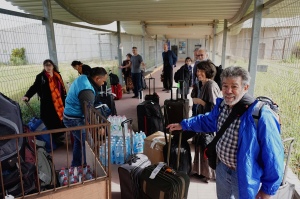Gaza: “If you survive the trauma, it makes you stronger.” By Dr. Bill Dienst
The July-August 2014 assault killed about 2200 Gazans, wounded over 11,000 people, destroyed over 14,000 homes, displaced initially about half a million people and left about 100,000 people homeless. Palestinians in Gaza are now limited to about 6 hours of electricity per day with rotating blackouts.
When I came to Gaza in November 2014, very little had been accomplished in terms of reconstruction. The international community had pledged billions in reconstruction aid, but very little had made it into Gaza. This delay has reportedly been primarily due to onerous restrictions by Israel, while maintaining a comprehensive eight-year siege on Gaza. I am told, “The Israelis control every aspect of our lives.”
Prior to the siege and the election of the Hamas government, Israel internally occupied Gaza and the population was subjected to a severely restricted life. The population of Gaza is growing and now numbers about 1.8 million.
Our Gaza colleagues tell us that Gaza does not need more aid as much as Gaza needs freedom.
Bokra, Bokra fil Mish Mish
This is a famous Palestinian saying, which loosely translates into “tomorrow, tomorrow never comes”. In spite of the reconstruction conference in Cairo at the end of last summer’s conflict, attended by US Secretary of State John Kerry and others, very little war damage has been repaired. It is deja vu all over again.
Previous wars brought promises of more freedom and reconstruction but these promises brought little in relief to the people of Gaza. Palestinian leaders are never invited to participate in the reconstruction conferences.
A similar conference attended by the previous US Secretary of State Hillary Clinton at the Egyptian resort town of Sharm El Sheikh in 2009 at the end of the Israeli assault called Cast Lead led to few tangible results. Locals here do not believe that this time will be any different. “We are all alone without the support of the world.”
Before last summer, 69 percent of the people in Gaza were dependent on humanitarian assistance. Now that figure hovers at around 80 percent.
People are still living in the streets and in ramshackle shelters scattered throughout the Strip. With no permanent housing for many people, several young children died of exposure-related hypothermia during the winter of 2014-2015.
By November of last year, 60,000 of the original 100,000 homeless remained homeless, and many remain homeless today. Those no longer considered homeless include families who have been absorbed by extended families and are living in overcrowded conditions.
Some UN schools are still being used to house homeless families – placing additional stress on those schools, which have now moved from double to triple shifting of classes in order to meet classroom needs.
According to Dr. Yasser Jamai, director of Gaza Community Mental Health Programme, there has been no improvement in the political, environmental or reconstruction situation. Now with the re-election of Benjamin “Bibi” Netanyahu in Israel last week, many believe that it is only a matter of time before Gaza is under attack again.
In spite of all this, Dr. Yasser, who lost many close family members last summer says, “If you survive the trauma, it makes you stronger, it gives you more power to cope with the hopeless situation.” He adds that close family bonds and the power of religion keeps this society together.
I am told by many friends in Gaza that this visit and our efforts to empower medical services give them some hope. I hope this is so.
During this next week, we will compare the present situation with what we witnessed in November. We will see what has changed, what remains the same and where help from the outside world might make a difference.
RSS feed for comments on this post. TrackBack URI
